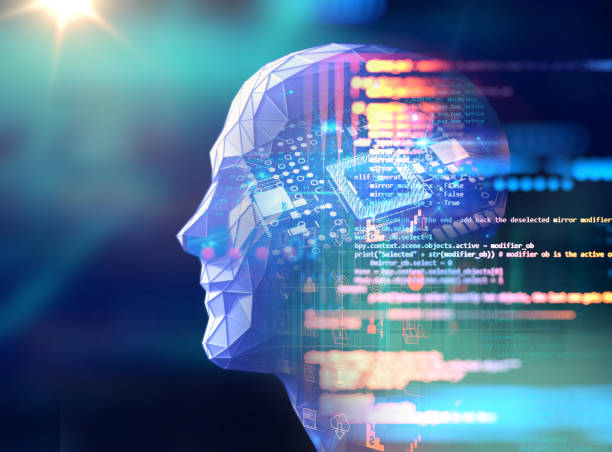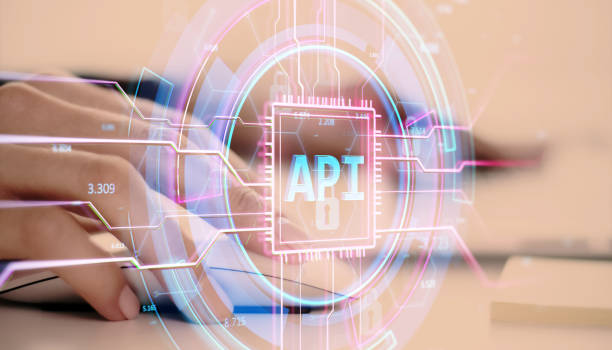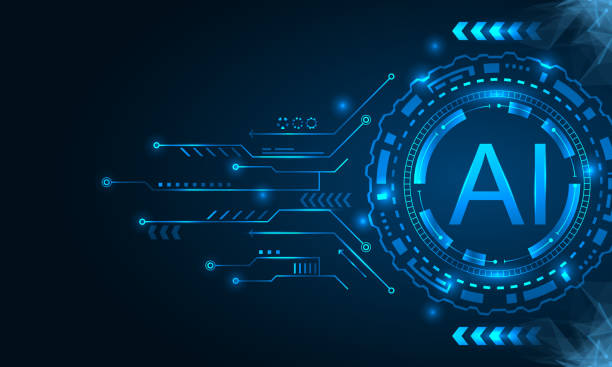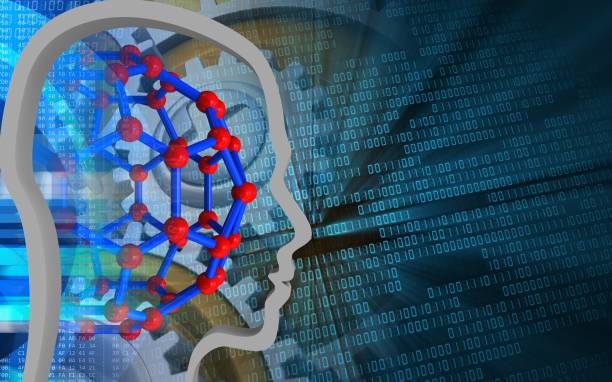What is Artificial Intelligence? Definition, History, and Basic Concepts
Artificial Intelligence (AI) is a branch of computer science that deals with creating machines that are capable of performing tasks that usually require human intelligence.
These tasks include learning, problem-solving, decision-making, natural language understanding, pattern recognition, and so on.
The main goal of #ArtificialIntelligence is to create systems that can automatically perform tasks without human intervention.
The history of artificial intelligence dates back to the 1950s, when scientists like Alan Turing and John McCarthy began exploring the possibility of building intelligent machines.
Over the years, this field has made significant progress and is now used in many industries and fields.
Basic concepts in artificial intelligence include Machine Learning, Neural Networks, Natural Language Processing (NLP), and Computer Vision.
Machine learning enables machines to learn from data and improve their performance.
Neural networks are computational models inspired by the structure of the human brain and are used to recognize patterns and solve complex problems.
Natural language processing gives machines the ability to understand and produce human language.
Computer vision allows machines to process and interpret images and videos.
Are you bothered by losing customers who visited your site to make a purchase?
Rasaweb is your specialized solution for having a successful online store.
✅ Significant increase in your online sales
✅ Creating trust and professional branding with customers⚡ Get free consultation from Rasaweb experts!
Types of Artificial Intelligence: A Detailed Look at Approaches and Applications
Artificial intelligence can be categorized into different types, including:
- Narrow AI: This type of artificial intelligence is designed to perform specific and limited tasks.
For example, a facial recognition system or a voice assistant like Siri are examples of narrow AI. - General AI: This type of artificial intelligence has cognitive abilities similar to humans and can perform any task that a human is capable of doing.
General AI is still in the development stages and has not been fully realized. - Superintelligence: This type of artificial intelligence surpasses human intelligence and can outperform humans in all areas.
Superintelligence is a hypothetical concept and does not yet exist.
Each of these types of artificial intelligence has its own specific applications.
Narrow AI is used in various industries such as healthcare, manufacturing, transportation, and financial services.
General AI could play an important role in solving complex global problems in the future.
Superintelligence, if realized, could create fundamental changes in human life.
Machine Learning: The Beating Heart of Artificial Intelligence
Machine Learning is one of the most important subfields of artificial intelligence that allows machines to learn from data and improve their performance.
In machine learning, instead of being explicitly programmed, machines use algorithms and statistical models to identify patterns from data and make decisions based on them.
There are different types of machine learning algorithms, including:
- Supervised Learning: In this type of learning, the machine is trained using labeled data.
Labeled data includes inputs and desired outputs. - Unsupervised Learning: In this type of learning, the machine is trained using unlabeled data.
The goal here is to discover hidden patterns and structures in the data. - Reinforcement Learning: In this type of learning, the machine learns by taking actions in an environment and receiving rewards or penalties.
The goal here is to learn a strategy that yields the most rewards.
Machine learning is used in many applications including image recognition, speech recognition, market prediction, and product recommendation.
Below is a table of the types of machine learning algorithms and their applications:
| Machine Learning Algorithm | Type of Learning | Applications |
|---|---|---|
| Linear Regression | Supervised | Price Prediction, Trend Analysis |
| Decision Tree | Supervised | Decision-Making, Classification |
| K-Means Clustering | Unsupervised | Customer Segmentation, Anomaly Detection |
| Neural Networks | Supervised/Unsupervised | Image Recognition, Natural Language Processing |
Amazing Applications of Artificial Intelligence in Everyday Life
Artificial intelligence (AI) is increasingly penetrating our daily lives, often in ways we don’t even notice.
From our smartphones to online recommendation systems, AI is changing the way we interact with the world.
Some notable applications of artificial intelligence in everyday life include:
- Voice Assistants: Voice assistants like Siri, Google Assistant and Alexa use natural language processing to understand our voice commands and perform tasks such as setting alarms, playing music, and providing information.
- Recommendation Systems: Recommendation systems on platforms like Netflix and Amazon use machine learning algorithms to analyze data about our preferences and suggest movies, series, and products that we are likely to enjoy.
- Facial Recognition: Facial recognition technology is used in smartphone cameras, security systems, and other applications to identify and authenticate individuals.
- Self-Driving Cars: Self-driving cars use artificial intelligence to understand their surroundings and navigate without human intervention.
Are you tired of your company’s website not being seen as it should be and losing potential customers? Solve this problem forever with professional and effective website design by Rasaweb!
✅ Increase brand credibility and build customer trust
✅ Attract targeted sales leads
⚡ Contact us now for a free consultation!
Advantages and Disadvantages of Artificial Intelligence: A Realistic Look
Like any other technology, artificial intelligence (AI) has its own advantages and disadvantages.
Understanding these advantages and disadvantages is essential for making informed decisions about how to use AI and managing its potential risks.
Some of the key advantages of artificial intelligence include:
- Increased Productivity: AI can automate repetitive and tedious tasks, allowing humans to focus on more creative and strategic tasks.
- Improved Accuracy: AI systems can analyze data more accurately than humans, reducing the likelihood of errors.
- Reduced Costs: AI can reduce operating costs by automating tasks and reducing the need for human labor.
Click here to preview your posts with PRO themes ››
However, artificial intelligence also has disadvantages, including:
- Job Loss: Automation caused by AI can lead to job losses in some industries.
- Bias: AI systems can reinforce existing biases in their training data, leading to unfair decisions.
- Privacy Concerns: The use of AI can lead to the collection and use of personal data, raising privacy concerns.
The Future of Artificial Intelligence: Challenges and Opportunities
The future of artificial intelligence (AI) is bright and full of opportunity, but it also comes with challenges.
Continued advancements in machine learning, natural language processing, and computer vision are opening new doors for AI applications in various fields.
Some of the key trends shaping the future of AI include:
- Explainable AI (XAI): XAI focuses on creating AI systems that can explain how they make decisions.
This is essential for increasing trust in AI and ensuring its accountability. - Edge AI: Edge AI refers to running AI algorithms on local devices such as smartphones and cars.
This can reduce latency and improve privacy. - Ethical AI: Ethical AI focuses on developing and using AI in an ethical and responsible manner.
This includes addressing issues such as bias, discrimination, and privacy.
To fully harness the potential of AI, we must address the challenges ahead and ensure that this technology is used for the benefit of all members of society.
This requires collaboration between governments, industry, and academia.
Artificial Intelligence and Ethics: Considerations and Responsibilities
With the ever-increasing expansion of artificial intelligence, the ethical issues associated with this technology are becoming more important.
Decisions made by AI systems can have profound impacts on people’s lives, and it is necessary that these decisions are made with ethical values in mind.
Some of the most important ethical considerations in the field of artificial intelligence include:
- Bias and Discrimination: AI systems can reinforce biases present in their training data, leading to unfair decisions.
For example, an AI-based hiring system may unintentionally favor male candidates over female candidates. - Privacy: The use of AI can lead to the collection and use of personal data, raising privacy concerns.
It is necessary to have regulations and policies in place to protect individuals’ privacy against the misuse of AI. - Accountability: If an AI system makes a wrong decision, it is difficult to assign responsibility.
It is necessary to create legal and ethical frameworks for determining responsibility for the actions of AI systems.
Click here to preview your posts with PRO themes ››
Below is a table categorizing the types of ethical challenges in the development and deployment of artificial intelligence:
| Challenge | Description | Solutions |
|---|---|---|
| Algorithmic Bias | Transferring biases present in training data to AI systems | Using diverse and balanced data, continuous evaluation of algorithms |
| Data Privacy | Unauthorized collection and use of personal information | Complying with privacy laws, using data anonymization methods |
| Transparency and Explainability | Lack of understanding of how AI systems make decisions | Developing Explainable AI (XAI), providing understandable reports |
| Accountability | Unclear responsibility in case of errors or damage | Developing clear laws and regulations, establishing legal responsibility |
Artificial Intelligence in Iran: Current Status and Future Outlook
Artificial intelligence in Iran is also being considered as an emerging and important field.
Universities and research centers in Iran are conducting research projects in the field of artificial intelligence, and many startups are active in this field.
Some of the areas in which artificial intelligence is being developed in Iran include:
- Natural Language Processing: Developing natural language processing systems for the Persian language, such as machine translation systems and Persian voice assistants.
- Computer Vision: Developing computer vision systems for applications such as facial recognition, license plate recognition, and product quality inspection.
- Machine Learning: Developing machine learning algorithms for applications such as market prediction, fraud detection, and product recommendation.
However, the development of artificial intelligence in Iran also faces challenges, including a shortage of skilled workers, financial constraints, and access to quality data.
To develop artificial intelligence in Iran, more investment is needed in education and research in this field, and cooperation between universities, industry, and government should be strengthened.
Does your current website turn visitors into customers or scare them away? Solve this problem forever with professional corporate website design by Rasaweb!
✅ Create credibility and powerful branding
✅ Attract target customers and increase sales
⚡ Get a free consultation now!
How to Learn Artificial Intelligence: Resources and Learning Path
If you are interested in learning artificial intelligence, there are numerous resources and learning paths that you can use.
Some of these resources include:
- Online Courses: Online learning platforms such as Coursera, Udemy, and Edrak offer numerous courses in the field of artificial intelligence.
- Books: There are numerous books on artificial intelligence that you can use to learn the basic and advanced concepts of artificial intelligence.
- Scientific Articles: Scientific articles can familiarize you with the latest advances and achievements in artificial intelligence.
- Practical Projects: Completing practical projects helps you learn AI concepts in practice and strengthen your skills.
To start learning artificial intelligence, you can start by learning the basic concepts of mathematics, statistics, and programming.
Then, you can study online courses or books related to artificial intelligence and strengthen your skills by completing practical projects.
Impact of Artificial Intelligence on Various Industries
Artificial Intelligence (AI) is rapidly transforming various industries, having a far-reaching impact on how we work, produce, and deliver services.
This innovative technology, with its unique capabilities, enables improved efficiency, reduced costs, and the creation of new opportunities.
Here are some of the impacts of artificial intelligence on various industries:
- Healthcare: AI is used in disease diagnosis, drug development, treatment personalization, and hospital management.
AI systems can analyze medical images more accurately and help doctors diagnose diseases early. - Finance: AI is used in fraud detection, risk management, market prediction, and customer service.
Machine learning algorithms can identify unusual patterns in financial transactions and prevent fraud. - Manufacturing: AI is used in automating manufacturing processes, quality control, predicting equipment failure, and optimizing the supply chain.
Robots equipped with artificial intelligence can perform repetitive and dangerous tasks in production lines. - Transportation: AI is used in self-driving cars, traffic management, route optimization, and logistics services.
Self-driving cars can increase road safety and reduce traffic.
Click here to preview your posts with PRO themes ››
These are just a few examples of the impact of artificial intelligence on various industries.
With the ever-increasing advancement of artificial intelligence, it is expected that this technology will play an even more important role in the global economy in the future.
Frequently Asked Questions
| Question | Answer |
|---|---|
| What is the definition of Hoosh Masnooee (Artificial Intelligence)? | It is a field in computer science that aims to create intelligent machines that can think, learn, solve problems, and make decisions like humans. |
| Mention some common artificial intelligence applications. | Includes self-driving cars, voice assistants (such as Siri and Alexa), recommendation systems (such as Netflix and Amazon), facial recognition, and medical diagnosis. |
| What is the difference between Narrow AI (ANI) and General AI (AGI)? | Narrow AI is specialized in a single and specific task, while General AI possesses human intellectual ability to perform any cognitive task. |
| What is Machine Learning and its relation to artificial intelligence? | Machine learning is a branch of artificial intelligence that focuses on developing algorithms that allow systems to learn from data without explicit programming. |
| What are Artificial Neural Networks? | They are computational models inspired by the structure and function of the human brain, and used in deep learning to process data and discover complex patterns. |
| Mention some ethical challenges related to artificial intelligence. | Includes issues of privacy, bias in data and algorithms, job loss, and liability in case of errors or unfair decisions. |
| What is Natural Language Processing (NLP)? | It is a branch of artificial intelligence that focuses on enabling computers to understand, interpret, and generate human language in a useful and interactive way. |
| How can artificial intelligence affect the labor market? | It can lead to the automation of some routine tasks, requiring retraining of workers and creating new jobs in the areas of designing, developing, and maintaining artificial intelligence systems. |
| What is Computer Vision? | It is a field in artificial intelligence that enables computers to “see” and understand and interpret images and videos in the same way that humans do, enabling them to recognize objects and faces. |
| What is the importance of data in developing artificial intelligence systems? | Data is the fuel that feeds artificial intelligence systems, especially in machine learning. The quality and quantity of data greatly affect the accuracy and performance of the models and their ability to learn and make correct decisions. |
And other services of Rasa Web advertising agency in the field of advertising
Smart link building: A combination of creativity and technology to improve SEO ranking through a SEO-oriented content strategy.
Intelligent Conversion Rate Optimization: An innovative platform for improving sales growth with intelligent data analysis.
Smart reportage: A novel service to increase campaign management through marketing automation.
Intelligent marketing automation: A fast and efficient solution to improve SEO ranking with a focus on SEO-oriented content strategy.
Intelligent conversion rate optimization: An exclusive service to grow user engagement based on Google Ads management.
And more than hundreds of other services in the field of internet advertising, advertising consulting and organizational solutions
Internet advertising | Advertising strategy | Reportage advertisement
Resources
What is artificial intelligence and how does it work?
,What is Artificial Intelligence (AI)? (Everything About Artificial Intelligence)
,What is Artificial Intelligence (AI)?
,What is Artificial Intelligence? – In simple terms + applications and types
? To leapfrog your business in the digital world, count on the expertise of “Rasaweb Afarin”! We help you have a powerful and impactful online presence by offering comprehensive digital marketing services including multilingual website design.
📍 Tehran, Mirdamad Street, next to the Central Bank, South Kazerun Alley, Ramin Alley No. 6














